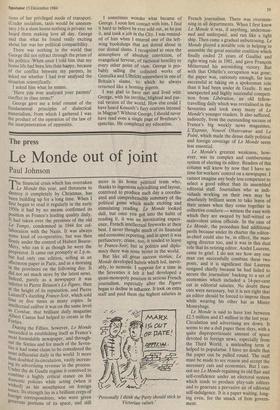The press
Le Monde out of joint
Paul Johnson
The financial crisis which has overtaken Le Monde this year, and threatens to destroy it completely by Christmas, has been building up for a long time. When I first began to read it regularly in the early 1950s it had by no means confirmed its Position as France's leading quality daily. It had taken over the premises of the old Le Temps, condemned in 1944 for col- laboration with the Nazis. It was always some kind of co-operative, but was then firmly under the control of Hubert Beuve- Mery, who ran it as though he were the Proprietor. It came out promptly at 2 p.m. but had only one edition, selling as an afternoon paper in Paris, and as a morning M the provinces on the following day. It did not set much store by the latest news. !ndeed, purely as a newspaper it was inferior to Pierre Brisson's Le Figaro, then at the height of its reputation, and Pierre Lazareff s dazzling France-Soir, which sold four or five times as many copies. In Intellectual calibre it was on the same level as Combat, that brilliant daily magazine Albert Camus had helped to create in the Forties.
During the Fifties, however, Le Monde succeeded in establishing itself as France's most formidable newspaper, and through- Out the Sixties and for much of the Seven- ties it had some claim to be considered the most influential daily in the world. It more !han doubled its.circulation, vastly increas- ing its advertising revenue in the process. Under the de Gaulle regime it contrived to embine a highly critical stance on his uOmestic policies while acting (when it w. ished) as his mouthpiece on foreign Issues. Its strength lay in a brilliant corps of reign correspondents, who were given generous portions of its space, and still more in its home political team who, thanks to ingenious sub-editing and layout, contrived to produce each day a coordin- ated and comprehensible summary of the political game which made exciting and stimulating reading. Le Monde looked dull, but once you got into the habit of reading it, it was an intoxicating experi- ence, French intellectual fireworks at their best. I never thought much of its financial and economic reporting, and in sport it was perfunctory; crime, too, it tended to leave to France-Soir; but in politics and diplo- macy there was none better in the world.
But like all great success stories, Le Monde developed hubris which led, inevit- ably, to nemesis. I suppose for a time in the Seventies it felt it had developed a quasi-monopoly position in serious French journalism, especially after the Figaro began to decline in influence. It took on extra staff and paid them the highest salaries in 'Personally I think the Party should stick to Victorian values.' French journalism. There was overman- ning in all departments. When I first knew Le Monde it was, if anything, underman- ned and underpaid, and run like a tight ship. Then came a gradual unbuttoning. Le Monde played a notable role in helping to assemble the great socialist coalition which finally ended 23 years of Gaullist and right-wing rule in 1981, and gave Francois Mitterrand his astonishing victory. But with that Othello's occupation was gone; the paper was, curiously enough, far less successful at taking on a spokesman role than it had been under de Gaulle. It met unexpected and highly successful competi- tion from Liberation, an old fellow- travelling daily which was revitalised in the Seventies and took away many of Le Monde's younger readers. It also suffered, indirectly, from the outstanding success of France's big weekly news magazines, L'Express, Nouvel Observateur and Le Point, which made the dense daily political and foreign coverage of Le Monde seem less essential.
Le Monde's greatest weakness, how- ever, was its complex and cumbersome system of electing its editor. Readers of this column will know by now that I have no time for workers' control on a newspaper. I cannot imagine any body less competent to select a good editor than its assembled editorial staff. Journalists who as indi- viduals working on their own may be absolutely brilliant seem to take leave of their senses when they come together in collective conclave — witness the ease with which they are swayed by half-witted or malevolent union officials. In the case of Le Monde, the procedure had additional perils because under its charter the editor- in-chief could also be, in effect, the man- aging director too, and it was in this dual role that its retiring editor, Andre Laurens, came to grief. I do not see how any one man can successfully combine these two posts, and it is significant that Laurens resigned chiefly because he had failed to secure the journalists' backing to a set of economies which included a 14-per-cent cut in editorial salaries. No doubt these cuts were necessary, but it is not right that an editor should be forced to impose them while wearing his other hat as Mister Moneybags.
Le Monde is said to have lost between £2.5 million and £3 million in the last year. Circulation and advertising are down. It seems to me a dull paper these days, with a quite disproportionate amount of space devoted to foreign news, especially from the Third World, a misleading term it helped to popularise. I have no doubt that the paper can be pulled round. The staff must be made to see reason and accept the necessary cuts and economies. But I can- not see Le Monde regaining its old flair and self-confidence under an electoral system which tends to produce play-safe editors and to generate a pervasive air of editorial self-indulgence. It is a paper waiting, long- ing even, for the smack of firm govern- ment.


















































 Previous page
Previous page